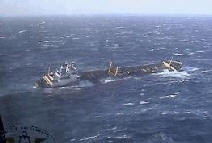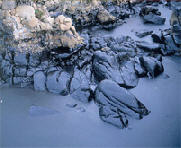|
Finally, during the phasing out period, those tankers that have not yet reached the age limit will be subject to stricter safety inspections.
The "Prestige," a 26 year old single hull oil tanker carrying 77,000 metric tons of heavy fuel oil, sank off the coast of Spain on November 19 creating an oil slick along the coastline of the Spanish state of Galicia which has caused a major economic and environmental disaster.
The Commission's proposal is the answer to a Christmas wish for a team of international wildlife rescuers at Pontevedra, Spain who will be missing Christmas at home with their families to care for sea birds oiled in the "Prestige" tanker disaster. The terrain is rugged, the weather inclement, and the accommodations spartan says the International Fund For Animal Welfare's (IFAW) Emergency Relief team.
"This year, I'm asking Santa to end the arrival of newly oiled birds," said Kim Elmslie, from Ottawa. "It would be great to see the sunken tanker under control, so there are no more oil slicks."
The IFAW team began arriving in Spain in mid-November as the stricken tanker limped out to sea from the northwest coast of Spain, leaving a trail of heavy fuel oil.
Five weeks later, with the sunken tanker still leaking tons of oil each day from the ocean floor, the relief team is working 12 hours a day, seven days a week, cleaning and caring for oiled birds caught in the slicks.
The IFAW Emergency Relief team is working closely with the nature conservation department of the Galician regional government, Xunta, and with the national institute for nature conservation in Portugal.
The "Prestige" spill has strengthened the resolve of EU politicians to protect the European coast. "Our first proposal of this kind dates back to just after the Erika disaster in December 1999," said Loyola de Palacio, vice-president for Transport and Energy, "The "Prestige" catastrophe makes it clear that the agreed compromise rules were not sufficiently ambitious. This will change."
The Commission proposed today to reinforce EU and international maritime safety rules agreed in the aftermath of the "Erika" disaster which spilled oil that washed up along the Brittany coast of France during Christmastime 1999.
The Commission re-instates today the proposed dates for phaseout it had put forward in the "Erika I" package crafted in the wake of the 1999 spill. These had been watered down in the subsequent legislative process.
Given its relatively low commercial value and low
risk of fire or explosion, heavy fuel is regularly
carried in older single-hull tankers. It is also the
most polluting type of oil when spilled at sea.
Due to its low volatility and high viscosity heavy
fuel oil can inflict the most severe damage on
marine and coastal ecosystems.
|

